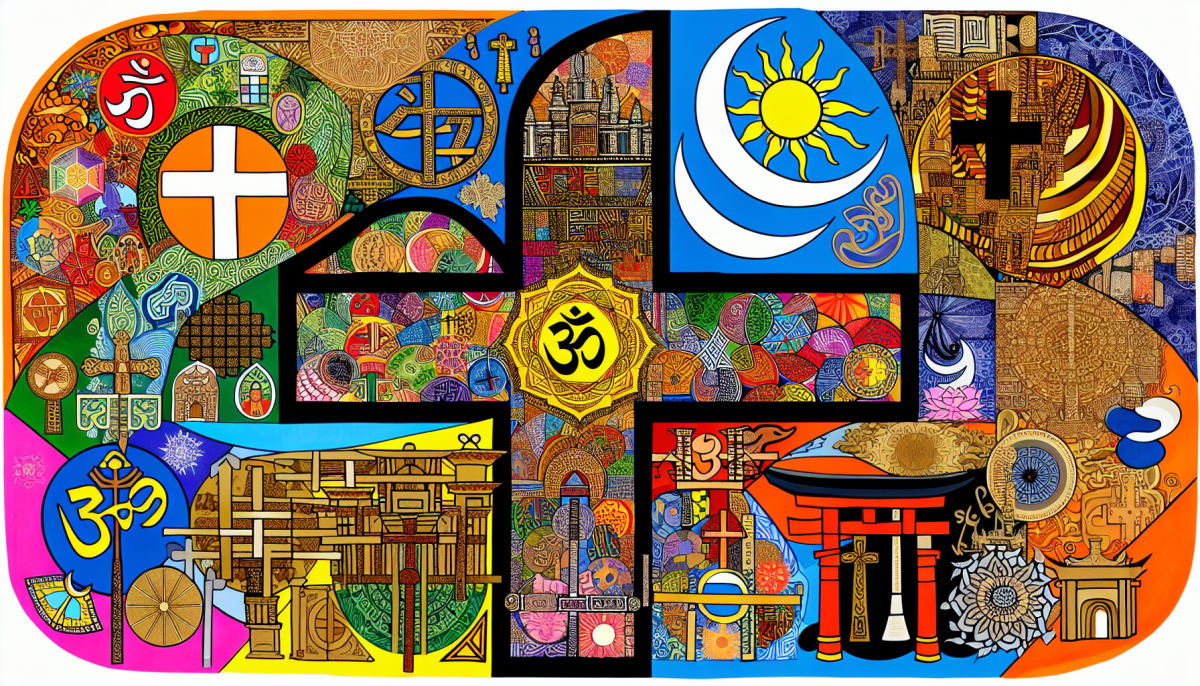Religion has shaped human history, cultures, and civilizations for thousands of years. Today, billions of people around the world follow different religious paths. Whether you're curious about faith traditions or exploring spiritual beliefs for the first time, this guide will introduce you to the top religions in the world — explaining their core beliefs, practices, and worldviews in a way that's easy to understand.
1. Christianity
Followers: Approximately 2.4 billion
Major Regions: Americas, Europe, Sub-Saharan Africa, parts of Asia and Oceania
Christianity is the largest religion in the world, based on the life and teachings of Jesus Christ, who lived in the 1st century CE in the Roman province of Judea. Christians believe that Jesus is the Son of God and the Savior of humanity.
Core Beliefs:
-
God: Christians believe in one God who exists in three persons: Father, Son (Jesus Christ), and Holy Spirit (known as the Holy Trinity).
-
Salvation: They believe that Jesus’ death and resurrection provide salvation from sin and eternal life with God.
-
Scriptures: The Bible, divided into the Old Testament and New Testament, is their sacred text.
-
Afterlife: Christians generally believe in heaven and hell, where individuals go based on their relationship with God.
Key Practices:
-
Prayer
-
Worship services (especially on Sundays)
-
Baptism and Communion
-
Acts of charity and mission work
Major branches include Catholicism, Protestantism, and Eastern Orthodoxy.
2. Islam
Followers: Approximately 1.9 billion
Major Regions: Middle East, North Africa, South Asia, Southeast Asia
Islam was founded in the 7th century CE in Mecca, Saudi Arabia, through the prophet Muhammad, who Muslims believe is the last messenger of God (Allah).
Core Beliefs:
-
God: Muslims worship one, all-powerful God called Allah.
-
Prophets: Muhammad is the final prophet, following earlier prophets like Abraham, Moses, and Jesus.
-
Holy Book: The Quran, considered the literal word of God revealed to Muhammad.
-
Five Pillars: Key acts of worship include faith declaration (Shahada), prayer (Salah), almsgiving (Zakat), fasting during Ramadan (Sawm), and pilgrimage to Mecca (Hajj).
Key Practices:
-
Daily prayers (five times a day)
-
Fasting during Ramadan
-
Giving to the poor
-
Performing the Hajj at least once if able
Islam is primarily divided into Sunni and Shia branches.
3. Hinduism
Followers: Approximately 1.2 billion
Major Regions: India, Nepal, Mauritius, Bali (Indonesia)
Hinduism is often considered the world's oldest living religion, with roots stretching back over 4,000 years. Unlike Christianity and Islam, it doesn’t have a single founder or single sacred text.
Core Beliefs:
-
Brahman: A supreme cosmic spirit that manifests in many gods and goddesses.
-
Reincarnation: Souls are reborn in new bodies through cycles of birth, death, and rebirth (samsara).
-
Karma: Good or bad actions determine future experiences, including future rebirths.
-
Moksha: The ultimate goal is liberation from the cycle of reincarnation.
Key Practices:
-
Ritual worship (puja)
-
Meditation and yoga
-
Festivals like Diwali (Festival of Lights) and Holi (Festival of Colors)
-
Pilgrimages to holy sites like Varanasi and the Ganges River
Hinduism is incredibly diverse, with various gods (like Vishnu, Shiva, and Devi) revered in different traditions.
4. Buddhism
Followers: Approximately 500 million
Major Regions: East Asia, Southeast Asia, Tibet
Founded by Siddhartha Gautama (the Buddha) in the 5th–6th century BCE in India, Buddhism teaches a path to spiritual enlightenment based on wisdom, ethical conduct, and mental discipline.
Core Beliefs:
-
Four Noble Truths: Life involves suffering; suffering is caused by desire; suffering can end; and there is a path (the Eightfold Path) leading to the end of suffering.
-
Karma and Rebirth: Similar to Hinduism, actions impact future lives.
-
Nirvana: The ultimate goal is achieving Nirvana — liberation from suffering and the cycle of rebirth.
Key Practices:
-
Meditation
-
Mindfulness
-
Ethical living (non-harming, truthfulness, compassion)
Buddhism has many schools, including Theravada, Mahayana, and Vajrayana, each with its own interpretations and practices.
5. Sikhism
Followers: Approximately 30 million
Major Regions: Punjab (India), United Kingdom, Canada
Sikhism emerged in the 15th century CE in Punjab, India, founded by Guru Nanak and developed through nine successive Gurus.
Core Beliefs:
-
One God: Sikhs believe in one formless, timeless God.
-
Equality: All humans are equal, regardless of caste, gender, or religion.
-
Service: Living a truthful, honest, and selfless life serving others.
Key Practices:
-
Daily prayers
-
Community service (seva)
-
The wearing of the Five Ks (articles of faith like the kara bracelet and kirpan sword)
-
Gathering in a Gurdwara (Sikh temple)
The Sikh holy book, the Guru Granth Sahib, is revered as the eternal Guru.
6. Judaism
Followers: Approximately 15 million
Major Regions: Israel, United States, Europe
Judaism is the oldest Abrahamic religion, tracing its history back over 3,000 years to Abraham and Moses.
Core Beliefs:
-
One God: Jews believe in a singular, all-powerful God who made a covenant with the Jewish people.
-
Sacred Texts: The Torah (first five books of the Hebrew Bible) is central, along with other writings like the Talmud.
-
Ethical Living: Emphasis is placed on following God’s laws (mitzvot) and living a life of justice, mercy, and faithfulness.
Key Practices:
-
Observance of the Sabbath (Shabbat) from Friday evening to Saturday evening
-
Dietary laws (kosher)
-
Celebrating festivals like Passover, Yom Kippur, and Hanukkah
There are several branches, including Orthodox, Conservative, and Reform Judaism.
7. Other Notable Religions and Belief Systems
While the six religions above account for the majority of the world's religious population, several other significant belief systems shape millions of lives:
-
Taoism: An ancient Chinese philosophy and religion emphasizing living in harmony with the Tao (the Way).
-
Shinto: Japan’s indigenous spirituality, focusing on ritual practices and the veneration of kami (spiritual beings).
-
Bahá'í Faith: Founded in 19th-century Persia, teaching the essential worth of all religions and the unity of humanity.
-
Traditional African Religions: Diverse spiritual practices across Africa focusing on ancestor worship and the spirit world.
Conclusion: Exploring the World of Faith
Religion continues to influence art, culture, law, and daily life around the world. Each faith tradition carries deep wisdom, rich traditions, and unique perspectives on humanity's place in the universe.
If you're just starting to explore these traditions, remember: understanding religion isn't just about beliefs — it's about the ways people live, hope, and connect with something greater than themselves.







